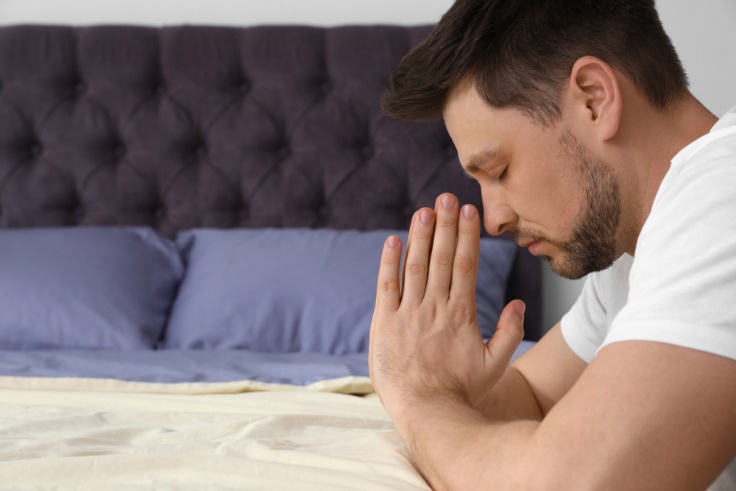
Besides building a strong connection with God, spirituality provides many more mental health benefits. Issues like insomnia, stress, anxiety and other psychological orders can be addressed successfully with the practice of prayers.
If we analyze deeply, we can understand how insomnia and sleep disturbances are related to elevated levels of stress. Some people find it hard to sleep, while others wake up in the middle of the night. Psychological experts believe that these sleep disturbances can be resolved by addressing the root cause, which is anxiety and stress.
Thankfully, spirituality can help us cope with these chronic mental health issues. The practice of mindfulness, mediation, bowing, prostrating, etc., controls stress and plays a big role in dealing with sleeplessness. Let us try to understand the impact of prayer on sleep and stress alleviation:
Connection with the Creator
Religiosity connects us with the Creator and builds a strong bond of relationship. This bonding can be accomplished in multiple ways. Some of them are:
1. Offering Multiple Short Prayers
When we say a prayer, we try to build our connection with God. Even if we are completely hopeless, we have a firm belief that God is listening to us, and we will get a response sooner or later.
Furthermore, the act of prostration several times a day helps us relax from extreme negative thoughts. When we bow down, our muscles feel relaxed, and breathing slows down. This helps us alleviate the high stress levels. Regular practice of spirituality successfully treats anxiety and other severe disorders.
Furthermore, medical experts believe that patients with elevated stress levels should try to indulge in some activities and build connections. Mindful mediation, transcendental meditation, and the practice of repeating mantras are all activities that keep us engaged. Thus, prayers play a great role in dealing with stress.
2. Middle of the Night Prayer
Many well-known spirituality experts suggest praying in the middle of the night. This prayer is extremely helpful in coping with stress, mood swings, and anxiety. At this time, building a strong connection with God is easy as we get free from all worldly matters.
3. Early Morning Prayer
Prayers performed early in the morning help us in making a good start to the day. When we release the negative emotions, gain faith, and become optimistic, our mind goes towards positivity. Besides this, Morning Prayer can help us deal with REM. It is a stage of a disturbing dream commonly seen by stressed patients after midnight. When we wake up for the Morning Prayer, we successfully break REM and eliminates all negative stimuli caused by it.
Hope for the Future and Faith
Many mental health patients dealing with stress are hopeless. However, prayers give them a new light of hope. Whatever they do and recite in prayers makes them believe that God is there to decide the best for them. Besides this, prayers are an excellent source of gaining inner strength and self-confidence. Many spiritually active people need no one but God to support them. These feelings make them optimistic and provide courage to deal with the hardships of life.
Additionally, spirituality enhances our faith and prepares our minds to accept the challenges of life. Thus, if we indulge in spirituality, we will have no love for the materialistic things of this world. Consequently, our stress levels will decrease, and sleep improves.
Release of Tension and Negative Thoughts
Prayers are a perfect form of mindful mediation. Today, many psychotherapists suggest mindful mediation to get rid of anxiety and stress. Mediation is of multiple types, but the ultimate objective of this technique is to help your mind and body relax. When we meditate or offer prayer, we focus on the present and forget about other things crowding our minds.
Similarly, some forms of mediation help us feel the body sensations and learn to have patience. This technique is ideal for anger-management issues. Since people with anger problems find it hard to tolerate, they gradually learn the process by tolerating body feels like itching, twitching, etc.
Additionally, some forms of prayer let us breathe deeply and slowly. The repeated act of slow breathing along with muscle relaxation with the eyes closed is a proven technique for sleeping. This method works best for patients with insomnia as it alleviates the stress and puts the body at rest.
Now, people who say a prayer in the morning feel relaxed for the whole day as they release tension before starting their day. Similarly, night prayer helps in enjoying a peaceful sleep for the whole night.
Peaceful Sleep
Unfortunately, many of us suffer from insomnia, but only a few know about its cause. When stress in our mind is at its peak, the mind remains active, which stops us from sleeping. Whenever a person wants to sleep, the mind should be calm and quiet, free from all the distractions.
Now, consider a scenario in which an anxiety patient is unable to sleep due to body itching and consistent urges of killing someone. In this case, the patient needs to reduce the level of anxiety to calm down the body. Instead of taking anti-depressant medications, offering a dedicated prayer can be helpful.
The prayer will help the patient in distracting the mind and gaining control. An anxiety patient who is spiritual, too, is less likely to lose control due to these urges because of the faith in God.
Positive Cognitive Functioning
Psychotherapists and medical experts suggest physical activities for patients with stress and insomnia. Just like walking or light exercises, many forms of prayers involve physical activities. If we follow the exact prayer timings, we can successfully indulge in these physical and spiritual acts. This improves the blood flow in our mind and body, which in turn produces happy hormones and makes us feel good.
Wrapping It Up
In short, prayers play a significant role in stress alleviation. Sleep disturbance, which is another growing problem in stress patients, can also be successfully addressed by offering prayers. Prayers enhance our faith, make us optimistic, and help us relax. When we offer prayers, our mind produces happy hormones, which alleviate the stress. Furthermore, prayers remind us that the Creator is there to decide the best for us. Thus, this belief and connection help us feel free from worldly matters.
Stress can lead to poor sleep and, in turn, overall poor health. If you feel that your sleep issues are actually a chronic sleep disorder, call the Alaska Sleep Clinic today @ 907-357-6700 to speak with one of our board-certified sleep specialists today. Improve your sleep. Improve your life.

Shaheryar provides ghostwriting and copywriting services. His educational background in the technical field and business studies helps him in tackling topics ranging from career and business productivity to web development and digital marketing. He occasionally writes articles for Muslim Pro.











